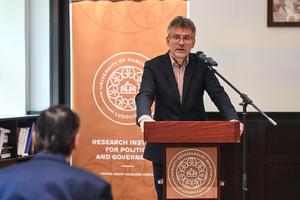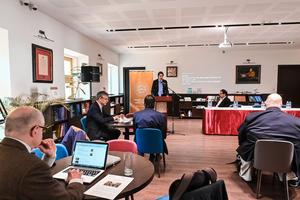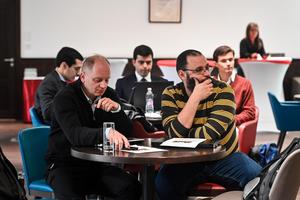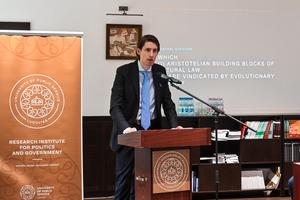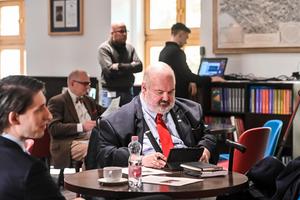On 25th April 2024, the Research Institute for Politics and Government at Eötvös József Research Centre, Ludovika University of Public Service hosted a conference under the title Neo-Aristotelian Politics: Recent Debates on Virtue, Natural Law and Technology with the participation of a wide variety of international scholars. The aim of the conference was to bring together representatives of political philosophy and political theory as well as historians of ancient and early modern political thought, who are engaged in Aristotle-scholarship in the context of contemporary challenges, to discuss in what respect Aristotle’s ideas on politics can be inspirational to tackle our most pressing political dilemmas.
The first speaker of the conference, H. G. T. Decker (Maastricht University) discussed what symmetries can be found between evolutionary biology and Aristotelian natural law. Kálmán Tóth (Ludovika UPS) examined the phenomenon of self-proclaimed excellence in modern and contemporary British political culture in the light of Aristotelian virtue ethics. José Maria Duarte (Lisbon University) enquired into the role of the Aristotelian virtue of friendship in modern politics. Ferenc Hörcher (Ludovika UPS) detailed the theoretical framework of an ongoing research project on the concept of politics and the political in modern Hungarian political thought, concentrating on the tension between the Aristotelian concept of homonoia and stasis. According to him, the Aristotelian approach to politics is the golden mean between the power-centred Schmittian-Machiavellian, and the deliberative Arendtian-Habermasian concept on the essence of politics.
The first keynote speaker of the conference, Erik Bootsma (Catholic Distance University) elaborated an Aristotelian approach to architecture, showing its political relevance, and argued in favour of an at least partial return to the classical and vernacular traditions of architecture.
The second keynote lecture was held online by David McPherson (University of Florida) discussing the innate relation of Aristotelian virtue ethics and an Aristotelian virtue politics based on his recent books.
The afternoon session started with the talk of Clifford Bates (University of Warsaw), who re-evaluated the importance of Book 5, Chapter 4 of Aristotle’ Politics, where he talks in a way that reveals the realist nature of his thought, including his reference to techniques of persuasion, conceit and force. Then Tamás Nyirkos (Ludovika UPS) discussed the problem of the tyranny of the majority in an Aristotelian framework, and Rafał Paweł Wierzchosławski (Adam Mickiewicz University, Poznań) outlined the possibilities of a Neo-Aristotelian political philosophy in the context of recent Polish philosophy of history and Catholic social thought.
The final segment of the conference examined the relation of Aristotle to contemporary thinkers. António Capela (AESE Business School) compared the Greek philosopher’s ideas of the golden mean to Romano Guardini’s idea of “polarity”. António Pedro Barreiro (Catholic University of Portugal) measured Fukuyama’s “End of History” and Nietzsche’s “Last Man” against a Neo-Aristotelian Framework, and finally, Ádám Smrcz (Ludovika UPS) interpreted Hannah Arendt’s remarks on the idea of the “tragedy of the commons”, that was prefigured by Aristotle and worked out in the discourse of modern economic history.
Kálmán Tóth
Research fellow
Ludovika University of Public Service, Eötvös József Research Centre, Research Institute for Politics and Government
Photo: Dénes Szilágyi
